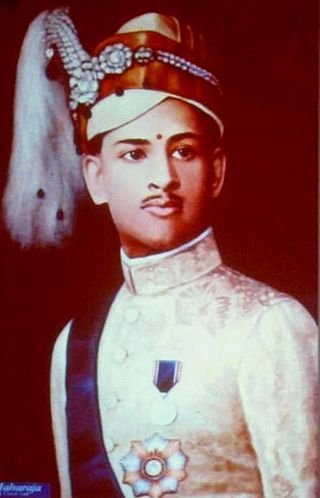
Sree Padmanabhadasa Sree Chithira Thirunal Balarama Varma, popularly known as Sree Chithira Thirunal, was the last ruling Maharaja of the Indian princely state of Travancore, in southern India until 1949 and later the Titular Maharajah of Travancore until 1991. His reign is known for several notable reforms that have indelible impact on the society and culture of Kerala.

Kerala Varma Valiya Koil Thampuran ; 19 February 1845 – 22 September 1914) also spelt Kerala Varma Valiya Koilthampuran and known as Kerala Varma, was a Malayalam - language poet and translator who had an equal facility in writing in English and Sanskrit from the Indian state of Kerala. He was a prince of Parappanad, and consort to the Senior Rani of Attingal and Maharani of Travancore, Bharani Thirunal Lakshmi Bayi, intended to father future sovereigns of Travancore, although the couple was childless, necessitating the adoption of Lakshmi Bayi's grand-nieces. Kerala Varma is also known as the Kalidasa of Kerala, and was both brother-in-law and cousin to painter Raja Ravi Varma, also a prince of Parappanad, though from the Kilimanoor branch, whom he presented with his first oil paints. A third Parappanad prince, his grammarian nephew A. R. Raja Raja Varma, is known as the Panini of Kerala.

Summer in Bethlehem is a 1998 Indian Malayalam-language romantic comedy film directed by Sibi Malayil and written by Ranjith. It was produced by Siyad Koker under the company Kokers Films. The film stars Suresh Gopi, Jayaram, Manju Warrier, and Kalabhavan Mani while Mohanlal makes a cameo appearance. The music was composed by Vidyasagar. It tells the story of Ravishankar (Jayaram), the bumbling friend of a successful landowner, Dennis, and the vacation visit by Ravishankar's relatives in Dennis' estate known as Bethlehem Estates in a fictional town of Chandragiri in the Nilgiris.
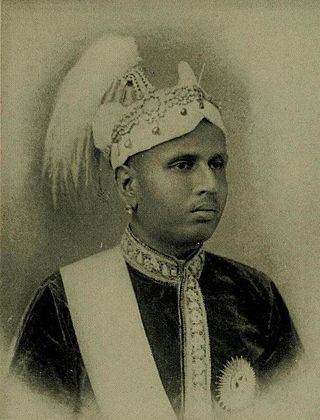
Sir Sri Moolam Thirunal Rama Varma VI (1857–1924) was Maharajah of the princely state of Travancore between 1885 and 1924, succeeding his uncle Maharajah Visakham Thirunal (1880–1885). Moolam Thirunal is considered as the first in India to implement the concept of public participation in governance through the formation of Travancore Legislative Council.

Pooradam Thirunal Sethu Lakshmi Bayi CI was the monarch, though designated as the Regent due to British policy, of the Kingdom of Travancore in southern India between 1924 and 1931. She, along with her younger cousin, Moolam Thirunal Sethu Parvathi Bayi, were adopted into the Travancore royal family and were the granddaughters of the celebrated painter, Raja Ravi Varma.

Maharani Ayilyom Thirunal Gowri Lakshmi Bayi (1791–1815) was the Maharani of the Indian state of Travancore from 1810 till 1813 and Regent from 1813 till her death in 1815 for her son Swathi Thirunal Rama Varma. She was the only Queen of Travancore to have reigned in her own right which she did for three years before becoming the regent for her son.

Maharani Uthrittathi Thirunal Gowri Parvathi Bayi (1802–1853) was the Regent of the Indian state of Travancore in 1815–1829. She succeeded her sister Maharani Gowri Lakshmi Bayi, till her regency was relinquished in favour of her nephew, Maharajah Swathi Thirunal.

The Travancore royal family was the ruling house of the Kingdom of Travancore.The Travancore royal family signed a treaty with the British in 1788, thereby adopting British dominance. Later, in 1805, they revised the treaty, leading to a diminution of royal authority and the loss of political independence for Travancore. They had to give up their ruling rights over the common people in 1949 when Travancore were forced to merge with Independent India and their political pension privileges were abolished in 1971.

Rukmini Varma is an Indian artist based in Bangalore.
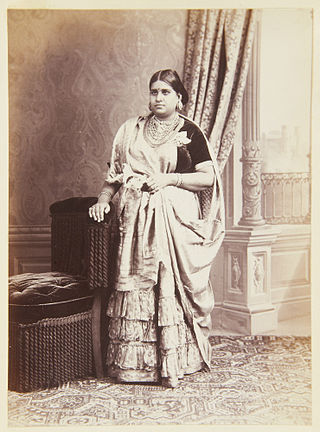
Maharani Bharani Thirunal Lakshmi Bayi CI was the Senior Rani of Travancore from 1857 till her death in 1901. Her consort was the famous poet and writer, styled the father of Malayalam literature, Sri Kerala Varma Valiya Koil Thampuran.
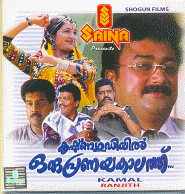
Krishnagudiyil Oru Pranayakalathu is a 1997 Indian Malayalam-language romance film written and directed by Kamal, starring Jayaram, Manju Warrier, Balachandra Menon, Biju Menon, and Vinaya Prasad. The music is composed by Vidyasagar.
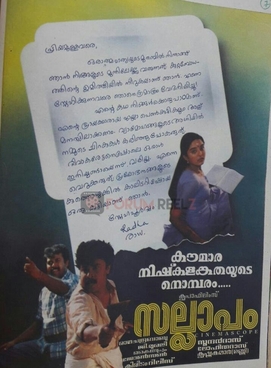
Sallapam is a 1996 Malayalam-language film directed by Sundar Das and written by A. K. Lohithadas, starring Dileep, Manoj K. Jayan, and Manju Warrier. The music was composed by Johnson. The film was remade in Telugu as Egire Paavurama.
Parappanad was a former feudal city-state in Malabar, India. The headquarters of Parappanad Royal family was at the town Parappanangadi in present-day Malappuram district. In 1425, the country divided into Northern Parappanad and Southern Parappanad. Southern Parappanad included parts of Tirurangadi Taluk and the town Parappanangadi. Northern Parappanad included Panniyankara, Beypore, and Cheruvannur of Kozhikkode Taluk. Parappanad royal family is a cousin dynasty of the Travancore royal family.

Raja Raja Varma Koil Thampuran, also known as Raja Raja Varma, was a Malayalam language poet and translator from the Indian state of Kerala who had an equal facility in writing in English and Sanskrit. He was born in Neerazhi Palace, Changanassery. He was part of the royal family of erstwhile Parappanad, Malabar.

Sree Padmanabhadasa Sree Moolam Thirunal Rama Varma is the current incumbent to the throne of Travancore. He is the youngest of the four children of the former titular Maharani of Travancore, Sree Padmanabhasevini Maharani Karthika Thirunal Lakshmi Bayi and her husband, Prince Consort Lt. Col. G. V. Raja of Poonjar Royal House.
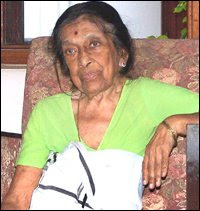
Maharani Karthika Thirunal Lakshmi Bayi (1916-2008) was the only sister of the last ruling Maharajah of Travancore, Sree Chithira Thirunal Balarama Varma and of his successor, Sree Uthradom Thirunal Marthanda Varma. Under the matrilineal Marumakkathayam system of inheritance prevalent in the kingdom of Travancore, it was her children who were heirs to the throne. She therefore held a very special place in the Travancore court, superior to the Maharaja's wives, and was termed the Rani of Attingal in her own right. In 2013, her only surviving son duly succeeded his uncles as titular Maharaja of Travancore and is known as Moolam Thirunal Rama Varma.
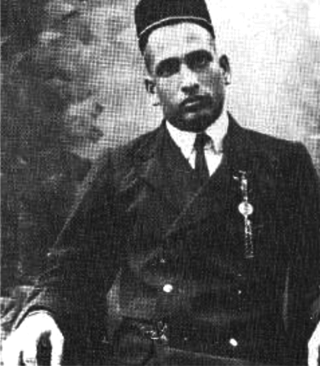
Koyi Thampuran was the title of the Prince Consorts of the Queens and Princesses of Travancore. The Koyi Thampurans' gained prominence and prestige in Kingdom of Travancore as they were the fathers of the then reigning Kings. In Travancore, there were ten clans of Koyi Thampurans. The most ancient were the ones settled at Kilimanoor ; others were Kirthipuram, Pallam, Paliyakkara and Nirazhi, Ananthapuram, Chemprol, Cherukol, Karazhma and Vatakkemadham.

Lakshmipuram Palace is the royal palace of the Parappanad royal families at Changanassery. Palace is located at Puzhavathu near to Kavil Bhagavathy Temple. The Lakshmipuram Palace was built in 1811 AD by Travancore ruler Maharani Ayilyom Thirunal Gouri Lakshmi Bayi (1791–1815) on behalf of the family of her husband Raja Raja Varma Valiya Koil Thampuran. Until then, the royal family at the Neerazhi Palace in Changanacherry had been moved to newly built Lakshmipuram Palace. It was the seat of the royal family of Koi thampurans and has produced many illustrious writers such as Raja Raja Varma Koil Thampuran, Kerala Varma Valiya Koil Thampuran and A. R. Raja Raja Varma. Noted Malayalam singer and classical musician L. P. R. Varma also hails from this palace.

















